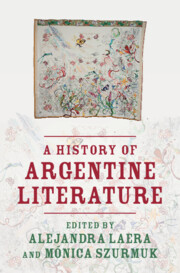Book contents
- A History of Argentine Literature
- A History of Argentine Literature
- Copyright page
- Contents
- Figures
- Contributors
- Editors’ Acknowledgments
- Introduction
- Part I Literary Dates
- Part II Critical Inroads
- Chapter 11 Print Culture in the Nineteenth Century
- Chapter 12 Criollismo: Gauchos in Literature and Film
- Chapter 13 Race and Nation
- Chapter 14 Science in Argentine Literature
- Chapter 15 Essay and Territory: The Geography of National Identity
- Chapter 16 Music as Sonic Literature
- Chapter 17 The Jewish Presence in Argentine Literature
- Chapter 18 Emancipation: Twentieth-Century Female Writers, Journalists, and Activists
- Chapter 19 Forsaking Tradition: Dislocating the Sovereignty of Argentine Literature
- Chapter 20 Mujeres raras: Patriarchal Nightmares, Dissident Imagination
- Part III Literary Names
- Index
- References
Chapter 14 - Science in Argentine Literature
from Part II - Critical Inroads
Published online by Cambridge University Press: 09 May 2024
- A History of Argentine Literature
- A History of Argentine Literature
- Copyright page
- Contents
- Figures
- Contributors
- Editors’ Acknowledgments
- Introduction
- Part I Literary Dates
- Part II Critical Inroads
- Chapter 11 Print Culture in the Nineteenth Century
- Chapter 12 Criollismo: Gauchos in Literature and Film
- Chapter 13 Race and Nation
- Chapter 14 Science in Argentine Literature
- Chapter 15 Essay and Territory: The Geography of National Identity
- Chapter 16 Music as Sonic Literature
- Chapter 17 The Jewish Presence in Argentine Literature
- Chapter 18 Emancipation: Twentieth-Century Female Writers, Journalists, and Activists
- Chapter 19 Forsaking Tradition: Dislocating the Sovereignty of Argentine Literature
- Chapter 20 Mujeres raras: Patriarchal Nightmares, Dissident Imagination
- Part III Literary Names
- Index
- References
Summary
This chapter will address contrasting ways in which Argentine literature has reflected on, and borrowed from, scientific theories and practices. Many nineteenth-century writers (such as José Mármol, Eugenio Cambaceres, and Lucio V. Mansilla) drew on (pseudo-)scientific discourses to lend legitimacy to their arguments, while others developed a critical approach to the legacies of positivism in Argentina. Dystopian visions of the imbrication of science, technology, and the politics of authoritarianism dominate the twentieth century, in texts that explore the experience of mass society or dictatorship. However, this chapter will also highlight cases of much greater ambivalence, such as that of Roberto Arlt, in whose work the pursuit of science and technology becomes both an instrument of violence and a fount of beauty and liberation. Furthermore, it will construct an important genealogy of authors – from Eduardo Holmberg in the final decades of the nineteenth century through to the contemporary writer Marcelo Cohen – who have conducted innovative metafictional explorations into the relationship between literature and science, and who have understood the porous boundary between them to be a source of great creativity.
- Type
- Chapter
- Information
- A History of Argentine Literature , pp. 216 - 231Publisher: Cambridge University PressPrint publication year: 2024



